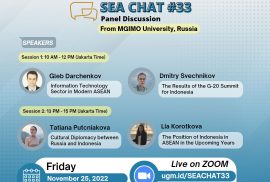The Center For Southeast Asian Social Studies of Universitas Gadjah Mada (CESASS UGM) continues to hold the 35th Southeast Asian Chat (SEACHAT) on 23 of December 2022. This panel discussion was presented by Muhammad Izam Dwi Sukma, CESASS UGM Student Intern from Islamic University of Indonesia. On this occasion, Izam presented his research titled “Reflecting The Role of Yang Di Pertuan Agong to Settle the Political Uncertainty After Malaysia 15th General Election.”
The discussion began with an overview of Malaysia. Starting from its Monarchy government and the political structure. Then he continued to elaborate the conditions of the Malaysian Government prior to the holding of the 15th General Election (GE) on 19 November 2022, after the parliament suspension and the resignation of previous Prime Minister (PM), Ismail Saabri Yakob. Izam underlined that before the 15th GE was held, Malaysia’s political condition could be considered unstable, because there have been three changes of prime ministers in the last 4 years.









